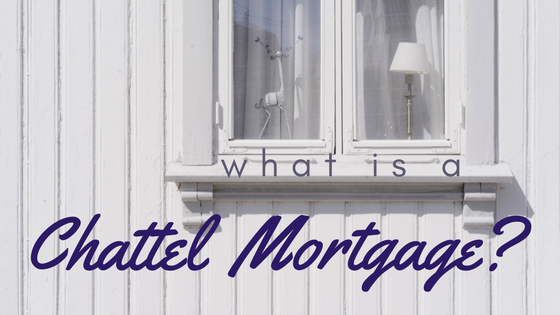What Is A Chattel Mortgage
January 24, 2018

A manufactured home can be classified in two ways: as personal property or as real property. The way a manufactured home is classified may seem unimportant or irrelevant at first glance. However, it often determines the financing options a buyer can access in order to purchase such a home.
In general, a manufactured home that is permanently affixed to a HUD-approved foundation can be purchased with a conventional mortgage, while a home titled as personal property can only be financed with a chattel loan.
On average, about 65 percent of the manufactured home buyers who choose to affix their homes to land they already own or are still paying for—and therefore could purchase them with the help of a conventional mortgage—prefer to take out a chattel mortgage.
Considering the confusion surrounding the topic of manufactured home financing and the increasingly widespread use of chattel mortgages, there is no better time than now to talk about this financing option.
What is a Chattel Mortgage?
A chattel mortgage is a form of financing that can be used to purchase or refinance a manufactured home that’s not permanently attached to land. For example, chattel mortgages can be used to finance the purchase of manufactured homes that are placed in land-lease communities, on individual rental sites, on family land, or on land that home buyers own outright or are still paying for.
How is it Different from a Traditional Mortgage?
Chattel mortgages are only used for property that is movable. While conventional mortgages are mostly reserved for homes that are stationary, chattel mortgages cover manufactured homes or other personal movable property. Chattel mortgages also only finance the property itself—not the land it sits on. Whereas conventional mortgages include the property as well as the land it’s on.
Chattel loans also have smaller repayment periods, lower fees and lower maximum amounts than traditional loans. Depending on the interest rate or APR, your monthly payments may be higher, but you’ll likely be able to pay off the loan in less time.
How a Chattel Mortgage Works in Practice
In a chattel mortgage, the lender holds a lien against the manufactured home that is used as collateral for the loan. The lien protects the lender’s interest in the property by providing some security in the case that the borrower fails to fulfill contract provisions. In the event of a default in payments, for instance, the lender can initiate repossession and sell the home to pay off the debt. Once the borrower repays the loan, the lender begins the process of removing the lien.
Benefits of Chattel Mortgages
A chattel mortgage can deliver a series of benefits, such as:
- Chattel mortgages are often structured as business loans, so the interest charged on the loan is tax deductible, with some limitations. Speak to a financial expert for info on specific tax benefits.
- Monthly mortgage payments can be structured similar to conventional mortgage payments.
- Because chattel mortgages are secured loans, their interest rates are generally lower compared to interest rates associated with unsecured loans.
- This often means you can pay off your chattel loan faster than a traditional loan.
Before applying for a loan, a prospective home buyer should carefully review the eligibility requirements of the financing options available for these types of homes, and ponder their pros and cons.
Manufactured homes and chattel loans can be a great option for those who can’t yet afford a traditional house, as well as those curious about the “tiny home” trend and other approaches to mobile living.
After deciding which financing alternative is best for his or her particular financial situation, the buyer should get approved for the loan with a quality loan company before starting the house hunting process.
What Steps Do I Take to Apply for a Chattel Loan?
Chattel mortgages are available through manufactured home loan lenders like Triad. Before you reach out to these companies about applying for a loan , consider following these steps:
- Read your credit report. The chattel loan lender will take your credit into consideration when you apply, and a better credit score might lead to a lower interest rate.
- Decide whether you will want to buy the land your movable property sits on. If you want to rent, there will likely be fewer loan options than if you plan to purchase the land where you'll place the manufactured home.
- Decide out what type of manufactured home you want to buy. This will affect the loan amount you receive.
How Do I Know If A Manufactured Home Is Eligible?
As long as your manufactured home is not located on a pier, on wooden pillars, or a basement, then they're eligible for a chattel loan. Although the chassis is hidden and the home typically doesn't move once it's been placed, these manufactured homes still retain a permanent chassis for transportation. As a result, these homes may still be commonly referred to as mobile homes.
“Mobile home” and “manufactured home” used to be interchangeable, before the U.S. Housing and Urban Development (HUD) declared certain strict standards for mobile homes in the 1970s. Now, movable homes built after that time are usually referred to as manufactured, while those constructed before are typically mobile homes, so long as they follow specific standards.
If you have more questions about the chattel mortgage process, or are ready to begin the process to buy a manufactured home, Triad is ready to help you get started. There are multiple financing options available for manufactured homes, whether you’re buying a new one or refinancing, and you’ll want a financial services company that specializes in chattel loans that can advise you on the next big step.
